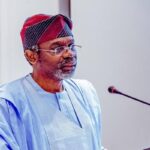By Felix Khanoba
The Academic Staff Union of Universities (ASUU) has lamented the present poor state of the Nigerian educational system.
National President of ASUU, Comrade Emmanuel Osodeke, who stated this during the inauguration of the Tertiary Education Trust Fund (TETFund) Board of Trustees and the governing councils of some federal tertiary institutions in Abuja on Thursday, called for urgent intervention to remedy the situation.
” Whether you like it or not, our educational system is in a very serious strait and there is a need to transform it….
“All of us who are here, when we were at the university, you had people from other countries sitting with you in the same hostel, sitting in the same classroom. You had lecturers from all over the world teaching you but today, it has gone so bad, that when you enter a typical university, 90% of the lecturers are from that state, ” Ooedeke said.
The ASUU president, however, commended TETFund for its massive intervention in the nation’s tertiary institutions, saying without it the story would have been worse.
“I also want to briefly say that the only thing still keeping us here today as a university is TETFund and that is a product of our struggle,” he said.
While making case for the completion of all ongoing TETFund’s projects spread across the country and transparent, Osodeke called for the involvement of relevant stakeholders on the issue of award of contracts in universities.
“There is also a need to have the stakeholder be involved in the process of awarding contracts at the university level, at the political level, and also the stakeholder being involved at the national level.
” That way, the people will determine what they want with the money and determine how that money is spent,” he said.
Inaugurating the TETFund’s Board of Trustees and the governing councils, Minister of Education, Professor Tahir Mamman, urged them to leverage on their expertise to drive significant improvements in quality and performance across the institutions.
The minister also challenged them to use their networks to attract resources and support for the institutions, emphasizing that the government has high expectations from them in addressing the challenges facing tertiary education.
“Your appointment is a clear recognition of your track records, established integrity, and experience. These appointments reflect the diversity of our nation, professions, expertise, and experience in various areas,” he said.
The minister who commended TETFund for its transformative role in the education sector, however, lamented the manner most Nigerian scholars have left for other countries, saying it has caused a major havoc in the system.
” The ASUU president earlier on mentioned the pivotal role TETFund has played in tertiary education in Nigeria. If you take away that agency, you probably have universities as ghost towns.
” Most of the interventions I have seen come from that agency and is probably one of the very few institutions that you can happily say that has been able to discharge that responsibility credibly.
” This is one institution that has been able to deliver on its mandate. And part of the problem, of course, is the adequate academic and technical staff. This Japa syndrome has caused immense havoc to our institutions, particularly the older public sector institutions that have been producing manpower for the rest of the institutions, ” he said.
The Minister also highlighted some challenges that institutions face, including low carrying capacity in universities and colleges of education and the instability of academic calendars due to strikes over the years.
He encouraged management to view unions as partners, noting that the government is engaging in robust discussions with ASUU to avoid strikes in the system.
According to him, one of the major responsibilities of councils worldwide is to attract resources from friends, businesses, and development agencies to improve institutions.
He stated that by working together and following due process, the Board and Councils will be able to act effectively and avoid problems.
“Yes, councils have autonomy, but that autonomy is within the context of certain national legislation. For instance, financial regulations are nationwide and universal. There are certain things councils can do, certain things they will do and pass on. Even from the ministry, there are things you pass on to us, and we pass them further.
“Use your contacts and network for the benefit of the universities. Do not merely focus on your allowances and privileges. Explore creative ways to bring resources to the universities,” he added.
On his part, the Executive Secretary of TETFund, Arc. Sonny Echono, congratulated the boards and governing councils for their nominations to serve in various capacities.
“I have no doubt that you will work diligently to justify the confidence placed in you by Mr. President. The education sector is critical to our national affairs.
“It is the foundation for all our development efforts, and Nigeria, with its rapidly growing youthful population, needs to prepare our young people to seize opportunities both domestically and internationally while helping to address our national challenges,” Echono said.



